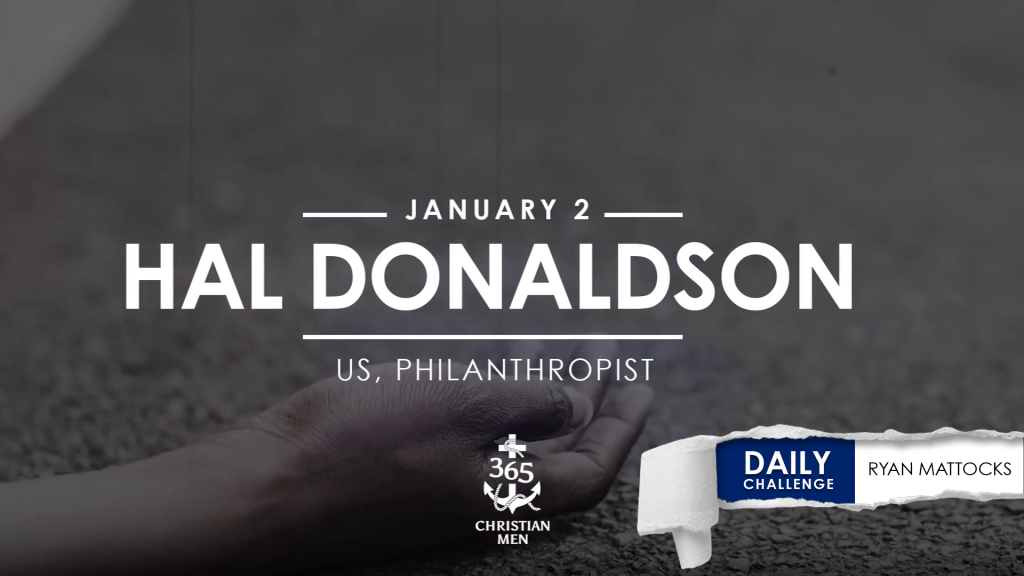January 2. Hal Donaldson. On this date in 1994, Hal Donaldson founded Convoy of Hope, a global humanitarian relief organization.
In 2010, before the earthquake—7.0 on the Richter Scale—Convoy of Hope was already serving 13,000 meals every school day. Within days of the disaster, Convoy brought in a bigger team to do more. By 2019, they were serving meals to 90,000 children.
In 2015, when an Ebola epidemic tore through West Africa, it devastated families, healthcare, agriculture, education, and employment. Borders closed, and food was scarce. Convoy of Hope provided 4 million meals and partnered with a coalition of 1,700 churches to get them distributed.
As of 2020, Hal Donaldson is still the CEO of Convoy of Hope, a project that started with a bunch of guys with pickups and good hearts. Here’s how it happened.
Where you start in life doesn’t have to dictate where you end.
One August evening, twelve-year-old Hal Donaldson and his two brothers were alone at home and getting ready for bed when the doorbell rang.
The boys opened the door.
Two police officers stood on the doorstep, and their eyes looked worried, their mouths serious. Fear zipped through Hal’s chest. The officers stepped inside, sat the boys down, and told them that a drunk driver had hit their parents’ car.
Dad was dead.
Hal tried to take it in, but everything was cloudy. In intensive care, Mom was fighting for her life. He and his brothers were all alone in the world. It was overwhelming.
But minutes later, neighbors and family friends flooded the Donaldson’s front yard. One of the officers asked if anyone would be willing to take the boys for the night. Otherwise, they would end up in the police station.
A young couple with four kids of their own—Bill and Louvada Davis—took Hal and his brothers in for the night in their small mobile home.
That one-night sleepover turned into many months of the boys living with the generous family, while Hal’s mom slowly recovered from broken bones and internal injuries.
In the small mobile home, there weren’t enough beds for all ten people, so they took turns sleeping on the floor. The Davises emptied their savings to provide for three extra children, and Bill worked extra hours at the rock quarry to feed everyone. Louvada spent her days “cooking, cleaning, and folding laundry.”
After Hal’s mom learned to walk again, she found a job as a mail clerk and rented a place for the family. But there had been no health insurance, so the family lived under the crushing weight of debt of the medical bills. Hal went to school with holes in his shoes and horrendous haircuts and came home to empty cupboards.
The loss of his dad and the poverty that followed filled Hal with bitterness. But the Davises continued to speak truth into Hal’s life: “Don’t allow the tragedy of your childhood to become a lifelong excuse,” Bill said, “because where you start in life doesn’t have to dictate where you end.”
Over time, Bill’s words worked their way into Hal’s young heart, and resentment faded.
Determined to free himself from the ugly poverty monster, Hal studied hard and graduated from San Jose State University with a bachelor’s degree in journalism. He got a job as a journalist and set his sights on earning money, raising a family, and traveling the world.
But everywhere he went, Hal encountered the poor: an orphaned boy without shoes, a homeless mother clutching her lifeless child, a Vietnam War veteran who had lost his legs. And when Hal saw these people, he couldn’t help but remember the how the Davises had showered him with kindness. Their generosity had embedded itself in Hal’s character.
They could have offered tears and pity, made excuses, and walked away. Instead, they had acted.
Inspired by their example, Hal laid down his own excuses. He joined forces with his two brothers and several friends, and together they loaded pickup trucks with groceries and distributed them to poor working families.
Their work grew into Convoy of Hope—an organization that has now fed and cared for more than eighty-million people.
“Forget the former things; do not dwell on the past. See, I am doing a new thing! Now it springs up; do you not perceive it? I am making a way in the wilderness and streams in the wasteland” (Isaiah 43:18–19 NIV).
What do you need to put behind you so that you can move forward? Where you start in life doesn’t have to dictate where you end.
Donaldson, Hal, Noonan, K. Your Next 24 Hours: One Day of Kindness Can Change Everything. Grand Rapids, Michigan: Baker Books, 2017.
Smith, Cory. “2008 12 People You Need to Know: Hal Donaldson.” Posted December 23, 2007. http://sbj.net/stories/2008–12-people-you-need-to-know-hal-donaldson,30357.





